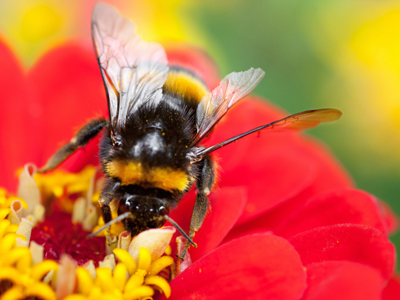
Ask the AI Tutor
Need help with Idioms 01? Ask our AI Tutor!
AI Tutor - Lucy
Connecting with Tutor...
Please wait while we establish connection

If you hear someone talking about 'the bee's knees' they might be talking about the knees of a bee but it is much more likely they mean that something is the best of its kind!
Idioms 01
Idioms are phrases with hidden meanings. In KS3 English, you’ll spot them in stories and speech. Learn to read beyond the literal words.
1 .
Which phrase means "just"?
A bird in the hand is worth two in the bush
A stitch in time saves nine
By the chattering of your teeth
By the skin of your teeth
Idioms often work by making you imagine the impossible. Teeth, of course, do not have any skin!
2 .
Which one means "to cause disagreement"?
Bone of content
Bone of contentedness
Bone of contention
Bone of contentment
You can imagine two dogs fighting over a bone
3 .
Which idiom means "an unsuccessful search"?
A wild bird chase
A wild duck chase
A wild goose chase
A wild swan chase
Literally you would run after a goose!
4 .
Which one means "to become angry"?
To see blue
To see green
To see red
To see white
Like a bull charging at a red cloth perhaps
5 .
Which expression means "doesn't fit in"?
A kettle of fish
Fish out of water
Other fish to fry
Swim like a fish
A fish is elegantly suited to its own context, water, but most cannot survive long out of that context
6 .
Which expression means "you need to do better"?
Pull your sock up
Pull your socks up
Put a sock in it
Sock it to them
Idioms can be tricky to understand when learning another language because their meanings are not literal, but metaphoric
7 .
Which one means "unlikely to happen"?
A pig in a poke
Pig-headed
Pig-iron
Pigs might fly
The image created by the idiom is impossible. Have you ever seen a pig with wings?
8 .
Which one exaggerates a problem?
Making a molehill out of a mountain
Making a mountain out of a molehill
Making a pebble out of a rock
Making an acorn out of an oak
A molehill is much smaller than a mountain!
9 .
Which one means "very bored"?
Bored to cry
Bored to laugh
Bored to smile
Bored to tears
Have you ever been so bored that it has made you cry? Seems unlikely!
10 .
Which idiom means "to be the best"?
A hornet's nest
The bee's knees
The bee's sting
The wasp's nest
An idiom creates a picture with no clue to its meaning. What is so special about a bee's knees? Do bees even have knees?
**Unlimited Quizzes Await You! 🚀**
Hey there, quiz champ! 🌟 You've already tackled today's free questions.
Ready for more?
Ready for more?
🔓 Unlock UNLIMITED Quizzes and challenge yourself every day. But that's
not all...
not all...
🔥 As a Subscriber you can join our thrilling "Daily Streak" against other
quizzers. Try to win a coveted spot on our Hall of Fame Page.
quizzers. Try to win a coveted spot on our Hall of Fame Page.
Don't miss out! Join us now and keep the fun rolling. 🎉
**Unlimited Quizzes Await You! 🚀**
Hey there, quiz champ! 🌟 You've already tackled today's free questions. Ready for more?
🔓 Unlock UNLIMITED Quizzes and challenge yourself every day. But that's not all...
🔥 As a Subscriber you can join our thrilling "Daily Streak" against other quizzers. Try to win a coveted spot on our Hall of Fame Page.
Don't miss out! Join us now and keep the fun rolling. 🎉






